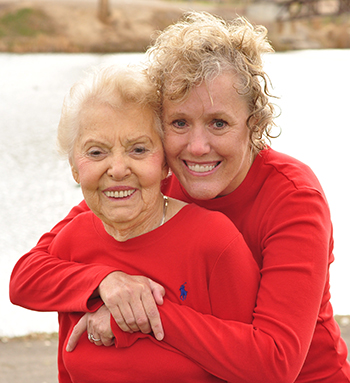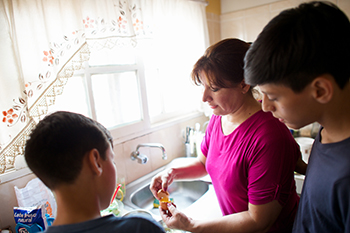Viewpoint: Honor Thy Parents
Contributed By the Church News

For adults, honoring parents means looking after their needs, seeking their counsel, including them in your lives, and living in ways that bring them peace and honor.
Article Highlights
- The “sandwich” generation is responsible for their dependent children and their elderly parents.
- The relationship between a child and his or her parents can be counted among the most sacred connections.
“Remember that parents and grandparents are our responsibility, and we are to care for them to the very best of our ability.” —President Ezra Taft Benson
Several years ago, the Church’s Welfare Department partnered in a wheelchair distribution project in an impoverished corner of Mexico City.
At an appointed hour, dozens of people with disabilities arrived at the project headquarters where they received a sturdy wheelchair that offered them the priceless gift of mobility.
The wheelchair recipients were a diverse lot. Many were children who had known health challenges since their births. Others were men and women who had lost the ability to walk due to accidents or, perhaps, diabetes or some other disease. All were poor.
One aged man arrived wearing his Sunday best. He walked on bent legs, but he carried himself with a certain dignity. He kept his right arm interlocked with the steady arm of his handsome middle-aged son.
The two walked slowly to the distribution area to claim the old man’s new wheelchair. Their synchronized movements required great effort, yet there was a familiar harmony between the two. They seemed well practiced in walking side by side.
The old man smiled broadly as he accepted a sturdy red wheelchair. As he left, he insisted on pushing himself forward. But, as always, his son walked at his side.
The wheelchair, purchased through the generosity of Church members, provided the old man with exciting new opportunities. He was the father of a loyal son. It’s unknown if the younger man was religious, but he surely obeyed the Lord’s fifth commandment: “Honour thy father and thy mother” (Exodus 20:12).

Honoring one’s parents remains as essential today as when Moses descended Mount Sinai with sacred tablets in hand.
Honoring one’s parents remains as essential today as when Moses descended Mount Sinai with sacred tablets in hand. Paul taught, “Children, obey your parents in all [righteous] things: for this is well pleasing unto the Lord” (Colossians 3:20).
For youngsters, “honoring parents” can mean doing what they are told—the first time. For teens, it’s about showing respect. Don’t talk back and always, always tell the truth. As for adults, honoring parents means looking after their needs, seeking their counsel, including them in your lives, and living in ways that bring them peace and honor.

A daughter gives her mother a hug. The relationship between a child and his or her parents can be counted among the most sacred connections.

A mother in Bolivia gets help from her sons in the kitchen. For youngsters, “honoring parents” can mean doing what they are told—the first time. For teens, it’s about showing respect. Don’t talk back and always, always tell the truth.
“If we truly honor [our parents], we will seek to emulate their best characteristics and to fulfill their highest aspirations for us,” said President Spencer W. Kimball. “No gift purchased from a store can begin to match in value to parents some simple, sincere words of appreciation. Nothing we could give them would be more prized than righteous living for each youngster” (The Teachings of Spencer W. Kimball, ed. Edward L. Kimball [1982], 348).
In 1991, Elder Dallin H. Oaks of the Quorum of the Twelve Apostles shared timeless counsel on obeying one of the Lord’s most vital edicts:
“The commandment to honor our parents has strands that run through the entire fabric of the gospel. It is inherent in our relationship to God our Father. It embraces the divine destiny of the children of God.
“This commandment relates to the government of the family, which is patterned after the government of heaven.
“The commandment to honor our parents echoes the sacred spirit of family relationships in which—at their best—we have sublime expressions of heavenly love and care for one another. We sense the importance of these relationships when we realize that our greatest expressions of joy or pain in mortality come from the members of our families.
“Other manifestations of this commandment include the bearing and care of children, the preparation of family histories, and efforts to see that the ordinances of eternity are performed for our departed ancestors.”
Elder Oaks then spoke to the young people of the Church—and then to those members who may feel exempt from the fifth commandment because their parents have passed on.
“Young people, if you honor your parents, you will love them, respect them, confide in them, be considerate of them, express appreciation for them, and demonstrate all of these things by following their counsel in righteousness and by obeying the commandments of God.
“To persons whose parents are dead, honoring parents is likely to involve thoughts of family reunions, family histories, temple work, and commitment to the great causes in which departed parents spent their lives.”
Today’s middle-aged members belong to the “Sandwich Generation” as they function as caregivers for both their adolescent children and their aged parents. The divine charge to “honour thy father and thy mother” holds increased day-to-day relevance. Almost three decades ago, President Ezra Taft Benson encouraged families to provide the elderly with love, care, and attention.
“Remember that parents and grandparents are our responsibility, and we are to care for them to the very best of our ability. When the elderly have no families to care for them, priesthood and Relief Society leaders should make every effort to meet their needs in the same loving way” (“To the Elderly in the Church,” Oct. 1989 general conference).
During His days in mortality, the Savior demonstrated tremendous honor to both His Heavenly Father and His earthly mother, Mary. Christ’s sacred prayers reveal the deep love and respect that existed between the Father and the Son.

And even in His dying moments on Calvary, Christ honored His mother through His expressed concern for Mary’s long-term temporal welfare.
And even in His dying moments on Calvary, Christ honored His mother through His expressed concern for Mary’s long-term temporal welfare:
“When Jesus therefore saw his mother, and the disciple standing by, … he saith unto his mother, Woman, behold thy son!
“Then saith he to the disciple, Behold thy mother! And from that hour that disciple took her unto his own home” (John 19:26–27).
The relationship between a child and his or her parents can be counted among the most sacred connections. Let us honor our mothers and fathers, living or dead, “that thy days may be long upon the land which the Lord thy God giveth thee.”
